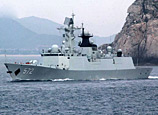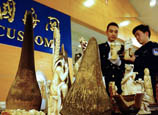
China is similarly central to the broader array of social issues the Durban Summit will address. Among them is developing the institutional capacity of the BRICS to address health issues of key concern for citizens inside and outside the club. This agenda embraces fostering regimes on intellectual property tilted more toward protecting poor people and patients than pharmaceutical firms with established property rights, preventing and controlling chronic non-communicable diseases, and putting health first as a driver of development.
China further has a critical role in guiding the BRICS approach to the pressing security issues of the day. In the field of new soft security, China is central is having the BRICS cooperate to enhance cyber-security and combat cyber-espionage, and to put in place a more broadly shared regime to govern the internet and information and communications technology in the twenty-first century world. In the field of traditional hard security, if China can continue to cooperate with India to lessen tensions over their longstanding border dispute and similarly reassure a Russia wary of intrusions into its thinly populated, poor regions near China, it would be a big boost for further BRICS cooperation across the board. Generating a consensus among BRICS countries on questions of international intervention in countries such as Libya in 2011 and Syria now could pave the way to a global solution that would save many innocent lives. And China along with Russia is essential in determining whether India and Brazil secure the enhanced status in the United Nations Security Council that they badly want.
Most broadly, China will face great expectations from its BRICS colleagues and the broader world to play a major leadership role. Both will remember the skill with which China hosted the third BRICS summit, at Sanya in 2011. It was at that summit that President Jacob Zuma of South Africa, the BRICS newest member and host of the Durban Summit, arrived at a BRICS summit for the first time. And Durban will be the first major outing on the world stage for China’s new leadership, especially as President Xi Jinping will be the freshest face among the BRICS leaders there. With this fresh face could come fresh approaches that could well determine the future of the BRICS institution and the outcome of the key global issues that it will confront. As the other new arrival at a BRICS summit is Russian president Vladimir Putin, China’s neighbour and the host of the G20’s St. Petersburg Summit six month after the BRICS’s Durban one, the bonds forged between the two could set the stage for a new burst of cooperation in global summitry writ large.
In making the Durban Summit, President Xi has had a strong start. He has just publicly proclaimed a broad, bold vision of the BRICS as a key forum to generate strong, sustainable and balanced growth, to strengthen global economic governance and to foster democracy in international relations as a whole. He views the BRICS as an important force to promote world peace as well as partnership and development with Africa, including through the BRICS Leaders–Africa Dialogue Forum that the Durban Summit will pioneer. To back his proclamations, he is putting in place the high-level diplomatic ground work with his first trip abroad taking him to Russia, Tanzania and the Republic of Congo as part of his visit to the BRICS summit itself.
The G20 and the St. Petersburg Summit
In the bigger G20 summit, China also has a decisive role and a historic global leadership opportunity as a result. This is true whether China chooses to exercise its power and potential through well-timed support for others’ initiatives, quiet bridge building between coalitions, direct protection of its own specific interests or broader initiatives for the good of all. As described in my book G20 Governance for a Globalized World, China has effectively performed all such roles at G20 summits in the recent past. On the G20’s development agenda it has built bridges between the advanced members of the G20 and the developing ones inside and beyond the club. China has protected its own interests by ensuring that the G20 action against tax havens favoured by the French could proceed, but in a way that preserved the position of Macau and Hong Kong.


















 Migrant families must leave as container 'village' unlawful
Migrant families must leave as container 'village' unlawful


![]()
